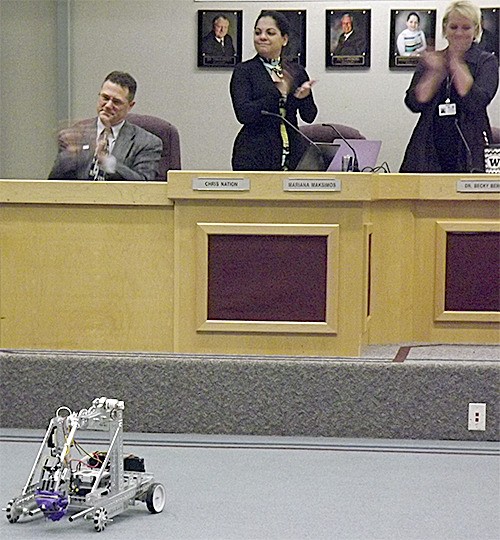MARYSVILLE – Better than video games? That’s what Rob Hollis thinks anyway.
Hollis is a parent volunteer and adviser to the Cedarcrest Middle School robotics club. He and club members appeared before the Marysville School Board Nov. 17 and entertained the board and the crowd.
Cedarcrest expected maybe 20 students in the program, but 100 students are taking three classes on robotics. There’s so much interest, there’s even an after-school club that will compete in competitions. It’s the only middle school in town with such a program.
“It’s better than them playing video games” because they can learn a skill, programming, that could help them get jobs later in life that start at $50,000 a year,” Hollis said.
In the main vote of the night, the school board approved the use of the state schools office’s “Since Time Immemorial” Tribal Sovereignty Curriculum. Kyle Kinoshita, executive director of learning and teaching, said he hopes teachers will start using the program second semester.
Materials are available online at www.indianed.org. Teachers at all grade levels will have the flexibility of how much to teach, from one day to one week to a classroom-based assessment project. About 50 teachers already have been trained to teach it.
The Tulalip Tribes have endorsed starting the curriculum. But starting in January, the school district wants to work with the tribes in developing supplemental curriculum so students can learn more about the culture of their neighbors.
Substitute House Bill 1495 passed in 2009 in the Washington state legislature. It was sponsored by then state Rep. John McCoy, D-Tulalip, who is now a state senator. It says there is a need for such curriculum and encourages city and tribal councils to collaborate on such an effort.
The resolution that passed says that students need to learn about and have a deeper understanding of the history, culture, government and experiences of their peers and neighbors. The resolution also says it wants to close the achievement gap for all students, and that Native American students likely would be more engaged in such a curriculum. It adds it is important to educate all citizens on the issue, but especially our youth, our future leaders.
Superintendent Becky Berg said the district has waited on the state curriculum because it wanted to start it at the same time as the Tulalip portion of it. But the tribes agree that it can’t be put off any longer.
In other news:
• The board talked about how the sting of the shooting at Marysville-Pilchuck continues. “We won’t get over this, maybe forever,” Berg said. “But life does return, slowly.” Albright said: “We’ve received tremendous support, but it will get harder. We have to be sensitive to the teachers and students. It will be a challenge.” Board member Chris Nation said a lesson learned from Columbine was people need to “seek out the help you need. You may feel strong now, but it will subside.” Board member Mariana Maksimos added: “I still hurt from what happened. We will try to get over it somehow.” She said before she became a school board member she used to worry about her kids in school. But since she became a part of it, “I never thought that it would happen in our school district. We need to be strong and move on. We need to be there for them.”
• Finance director Jim Baker said enrollment is down about 80 students, which could hurt the district financially if that trend continues. He hopes a bump at second semester will keep the budget on track.
• The board looked at academic data and compared it with districts its size. Overall, it looked like Marysville was up to 15 percent lower across the board in scores, board president Tom Albright said. Board member Pete Lundgren said the state started teaching to standards in 1993, but “we started late in the game,” about 10 years after that. Berg said instead of comparing to other districts, she’d rather see how the same class improves over time. “Our kids are just as smart and better looking,” she said with a smile.
• Angelica Mendoza and Roger DeVora of Marysville Getchell High School were honored as students of the month. Mendoza has a 3.75 grade point average, volunteers as a school tutor, takes care of her four siblings and wants to study Communications at the University of Washington. DeVora has a 3.8 gpa, is student body president, is captain of the cross country and soccer teams, works at American Eagle and wants to go to the UW for medicine or law and be involved in government.
• The school board will meet with the City Council at 5 p.m. Monday, Nov. 24.



